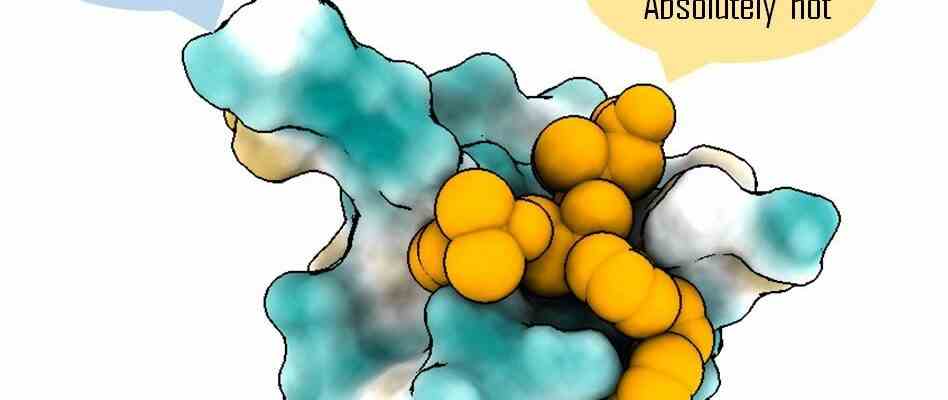Das Targeting von Nsp1 mit Montelukast (Singulair) hilft, das Herunterfahren der Proteinsynthese des Wirts zu verhindern. Bildnachweis: Mohammad Afsar
Ein orales Medikament, das zur Behandlung von Asthma und Allergien verwendet wird, kann an ein entscheidendes Protein binden und es blockieren[{” attribute=””>SARS-CoV-2 virus, and reduce viral replication in human immune cells, according to a new study by researchers at the Indian Institute of Science (IISc).
Approved by the US Food and Drug Administration (FDA), the drug, called montelukast, has been around for more than 20 years and is typically prescribed to reduce inflammation caused by conditions like asthma, hives, and hay fever. In the United States, montelukast is sold under the brand name Singulair.
In the study published recently in the journal eLife, the researchers show that the drug binds strongly to one end (‘C-terminal’) of a SARS-CoV-2 protein called Nsp1, which is one of the first viral proteins unleashed inside the human cells. This protein can bind to ribosomes – the protein-making machinery – inside our immune cells and shut down the synthesis of vital proteins required by the immune system, thereby weakening it. Targeting Nsp1 could therefore reduce the damage inflicted by the virus.
Montelukast is a drug used in the maintenance treatment of asthma that is marketed under the trade name Singulair and others. In general, it is less favored for this application than inhaled corticosteroids. It is ineffective in treating acute asthma attacks. Other applications include allergic rhinitis and long-lasting hives. It is a second-line therapy for allergic rhinitis.
“The mutation rate in this protein, especially the C-terminal region, is very low compared to the rest of the viral proteins,” explains Tanweer Hussain, Assistant Professor in the Department of Molecular Reproduction, Development and Genetics (MRDG), IISc, and senior author of the study. Since Nsp1 is likely to remain largely unchanged in any variants of the virus that emerge, drugs targeting this region are expected to work against all such variants, he adds.
Hussain and his team first used computational modeling to screen more than 1,600 FDA-approved drugs in order to find the ones that bound strongly to Nsp1. From these, they were able to shortlist a dozen drugs including montelukast and saquinavir, an anti-HIV drug. “The molecular dynamic simulations generate a lot of data, in the range of terabytes, and help to figure out the stability of the drug-bound protein molecule. To analyze these and identify which drugs may work inside the cell was a challenge,” says Mohammad Afsar, former Project Scientist at MRDG, currently a postdoc at the University of Texas at Austin, and first author of the study.
Working with the group of Sandeep Eswarappa, Associate Professor in the Department of Biochemistry, Hussain’s team then cultured human cells in the lab that specifically produced Nsp1, treated them with montelukast and saquinavir separately, and found that only montelukast was able to rescue the inhibition of protein synthesis by Nsp1.
“There are two aspects [to consider]: Das eine ist Affinität und das andere Stabilität“, erklärt Afsar. Das bedeutet, dass das Medikament nicht nur stark an das virale Protein binden muss, sondern auch ausreichend lange gebunden bleiben muss, um zu verhindern, dass das Protein die Wirtszelle beeinflusst, fügt er hinzu. „Das Anti-HIV-Medikament (Saquinavir) zeigte eine gute Affinität, aber keine gute Stabilität.“ Andererseits wurde festgestellt, dass Montelukast stark und stabil an Nsp1 bindet, wodurch die Wirtszellen die normale Proteinsynthese wieder aufnehmen können.
Hussains Labor testete dann in Zusammenarbeit mit Shashank Tripathi, Assistenzprofessor am CIDR, die Wirkung des Medikaments auf lebende Viren in der Bio-Safety Level 3 (BSL-3)-Einrichtung des Center for Infectious Disease Research (CIDR), IISc. und sein Team. Sie fanden heraus, dass das Medikament die Viruszahl in infizierten Zellen in der Kultur reduzieren konnte.
„Kliniker haben versucht, das Medikament zu verwenden … und es gibt Berichte, die besagen, dass Montelukast die Krankenhausaufenthalte reduziert[{” attribute=””>COVID-19 patients,” says Hussain, adding that the exact mechanisms by which it works still need to be fully understood. His team plans to work with chemists to see if they can modify the structure of the drug to make it more potent against SARS-CoV-2. They also plan to continue hunting for similar drugs with strong antiviral activity.
Reference: “Drug targeting Nsp1-ribosomal complex shows antiviral activity against SARS-CoV-2” by Mohammad Afsar, Rohan Narayan, Md Noor Akhtar, Deepakash Das, Huma Rahil, Santhosh Kambaiah Nagaraj, Sandeep M Eswarappa, Shashank Tripathi and Tanweer Hussain, 24 March 2022, eLife.
DOI: 10.7554/eLife.74877

